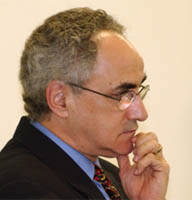Wednesday, April 7, 2010 | 5:00 PM EDT - 6:30 PM EDT
On April 7, the National Committee on U.S.-China Relations held a roundtable discussion with Professor David Zweig. He examined China’s search for energy and other resources and its impact on Sino-American relations.
Professor Zweig proposed that, while China is rising as a world power, it is simplistic to say that this is China’s century: China is rising but doing so within a system that is still dominated by the United States, the “hegemon.” We should not think about China’s rise without considering the role and the responses of the United States.
According to Professor Zweig, as China develops bilateral relationships with resource rich countries, there is a third party – the United States – in the room, and thus we see the “triangularization” of relations. Will relationships between China and other countries make Sino-American interactions more cooperative or more contentious? Should China become involved with suppliers that are considered by the United States to be pariah states, allies, or neutral?
David Zweig is Chair Professor, Division of Social Science, Hong Kong University of Science and Technology, and Director of the Center on China’s Transnational Relations. He received his Ph.D. from the University of Michigan, and spent a year as a postdoctoral fellow at the Fairbank Center, Harvard University. After teaching at the Fletcher School of Law and Diplomacy, Tufts University, for ten years, he moved to Hong Kong where he has lived since 1996. Dr. Zweig studied in Beijing for two years (1974-76), and was a visiting scholar at Nanjing University on three occasions (1980-81, 1986, and 1991-92).
Professor Zweig has written four books and edited four others. He is currently working on a book on Chinese who have studied abroad since 1978, and conducts research on Hong Kong-mainland ties, China’s resource diplomacy, and how living on the mainland affects the identity and political values of Hong Kong people.
